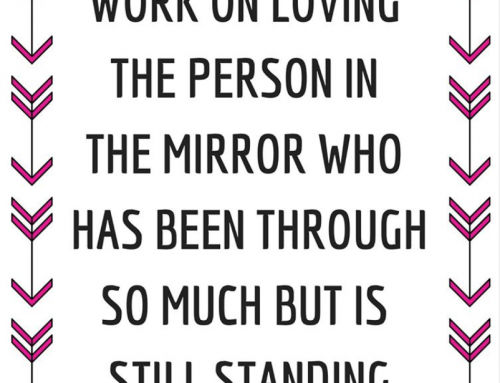We hear both of these words a lot and often lump them together in the same category. Especially now days when we see so much online about self love, acceptance, having a positive mindset and so forth.
But these two words actually mean different things and aren’t mutually exclusive.
Let’s break it down.
Mindset is your interpretation of the world, your perception behind events and other life situations.
We’ve all heard the line, “Do you see your glass as half empty or half full?”
This is a representation of mindset and whether or not we interpret things in a positive or negative way.
Do you believe that you are set in your ways and ‘you are who you are’ and there’s no changing it, even your shortcomings and weaknesses? Or, do you perceive things in a way where you see opportunity, where it’s always possible to grow and become a better person?
This is a fixed versus a growth mindset.
Mindset also plays a role in how we perceive events. Are you in a victim mindset where the world and bad things always happens to you? Where there is constantly drama in your life and you are always thrown under the bus by someone else? Where someone else is always out to get you?
Or instead, are you the type where you realize sometimes situations are out of your control, the cards fall as they do, but you’re not going to let it stop you from moving forward, growing and making a difference in the world? Where you accept what can’t be changed, make an effort to change what you can, and to face adversity and never give up.
This is a victim mindset versus a warrior mindset.
Once you identify your mindset and realize you want to improve and change it to a more productive one, you can start developing mental toughness.
These tools include things such as
- Learning how to set appropriate boundaries in your relationships and with strangers
- Example 1: You have a family member who regularly tries to take advantage of you. They constantly ask for a ride/to borrow your car, ask to borrow money and never pay you back. You know they have a job and they’re always buying new clothes and being irresponsible. If you want to put a stop to your family member always coming to you to bail them out, it’s your responsibility to learn to say no and define what behavior is and is not acceptable. It’s one thing to help someone out who is in need, it’s a different thing to be taken advantage of constantly.
- Example 2: An aggressive homeless person gets too close to you demanding money, it’s OK to hold out your hand and say, “Stop. That’s far enough.”
- Learning how to self soothe, breathe and calm yourself down so you can see clearly and not make rash decisions. It’s a skill to learn how to actively calm yourself down when in high stress situations. Practicing mindfulness, body awareness, deliberately taking time to respond (not react) is essential to mastering your emotions.
- Developing emotional intelligence. Learning to identify the root of your emotions and processing them in a healthy way, instead of using bandaids to numb yourself. It requires deeply reflecting to understand yourself and the “why” behind strong emotions, then taking steps to heal yourself instead of allowing your emotions to control you and resorting to destructive behaviors such as drugs or alcohol
- Mental toughness is learning to identify what is and is not in your control and responding appropriately.
- Example: Your landlord deciding to sell the house and giving you short notice to move out is stressful, yes, but it is out of your control. Working yourself up emotionally about it is only going to hinder you and make the whole process harder. When shit hits the fan, ask yourself what is and is notin your control, and what steps can you take moving forward? How are you going to respond to this?
- Mental Toughness is getting out of the “freeze-brain” where we become paralyzed by over-analysis. It’s taking in situations at face value, then deciding what is the best step to take to moving forward.
There is a lot to mindset and developing mental toughness, and this blog scratches the surface.
Hopefully it helped in some way.
If you ever want to learn more reach out to me at [email protected]




